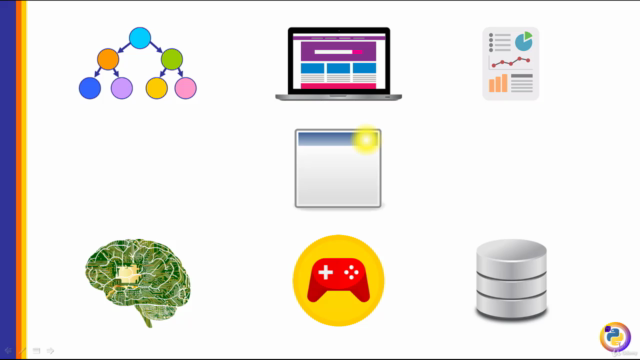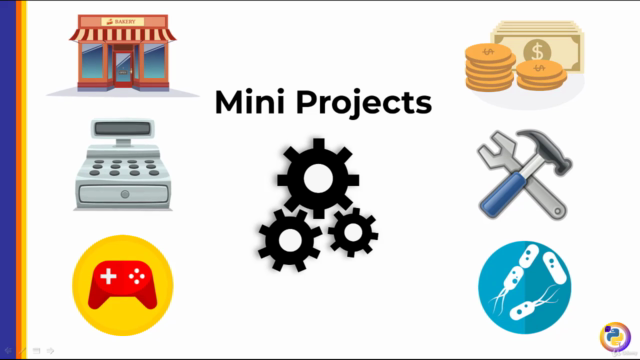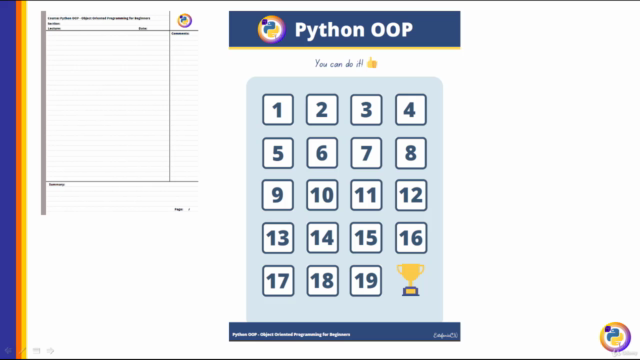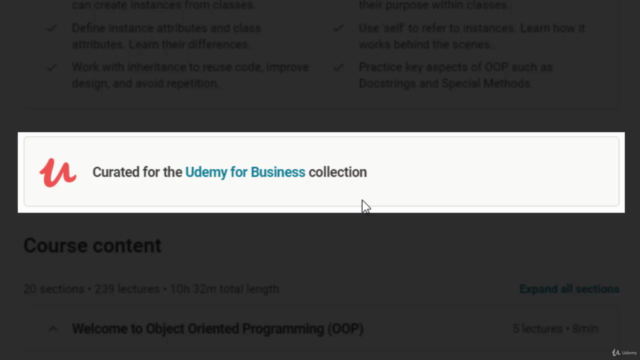Python OOP - Object Oriented Programming for Beginners

Why take this course?
¡Hola! It seems like you're describing a comprehensive and interactive online course on Object-Oriented Programming (OOP) in Python, which is a fundamental concept for any Python programmer. The course outlines a structured approach to learning OOP principles by building real-world applications such as Tic-Tac-Toe and a text-based War Card Game, among others.
The course appears to be designed with a variety of multimedia resources, including video lectures, interactive quizzes, coding exercises, and mini projects. These are meant to reinforce the learning process and help you apply what you've learned in practical scenarios. The emphasis is on understanding the "why" behind each concept, not just the "how," which can lead to a deeper comprehension of OOP in Python.
Here's a breakdown of what you can expect from such a course:
-
Classes and Instances: You'll learn how to define classes, create instances (objects) from those classes, and understand the difference between the two.
-
Instance Attributes: You'll explore how objects store data and how you can manipulate this data.
-
Class Attributes: You'll differentiate between class attributes that belong to the class itself rather than any particular instance.
-
Methods: You'll discover how functions (methods) can be defined within classes, and how they are used to operate on instances of the class.
-
The 'self' Parameter: You'll understand the role of the
selfparameter as a reference to the current instance of the class. -
Inheritance: You'll learn about deriving new classes from existing ones, and how this allows for code reuse and extends functionality.
-
Docstrings: You'll be encouraged to write descriptive docstrings for your functions and methods to make your code more readable and maintainable.
-
Special Methods: You'll learn about special methods (also known as "dunder" methods) that have double underscores at the beginning and end of their names, which allow you to override built-in behavior.
-
Practical Applications: By building games and other applications, you'll see how OOP principles are applied in real-world scenarios.
-
Lifetime Access: You'll have ongoing access to the course materials, which means you can revisit the content as needed, even after completing the course.
The course also seems to provide a certificate of completion and encourages learners to add this accomplishment to their resumes. This is a great way to demonstrate your new skills to potential employers or clients.
Overall, such a course can be a valuable resource for anyone looking to solidify their understanding of OOP in Python and to build a portfolio of projects that showcase their coding abilities. With a focus on visual explanations and practical application, learners can gain confidence and competence in Python programming.
Course Gallery




Loading charts...
Comidoc Review
Our Verdict
Python OOP - Object Oriented Programming for Beginners provides an engaging and detailed insight into Object Oriented Programming principles using Python. Although pacing might be a challenge for some learners, the instructor's clear explanations, hands-on projects, and responsive assistance offer excellent value for those eager to master OOP in Python.
What We Liked
- Comprehensive coverage of Object Oriented Programming (OOP) principles using Python, including instantiation process, class elements, methods, inheritance, and special methods.
- Engaging teaching style, making complex concepts easy to understand with clear explanations and practical examples.
- Various hands-on projects that solidify learning, enabling learners to create robust, efficient Python applications.
- Responsive instructor, providing extensive help and code modification support for students.
Potential Drawbacks
- Pacing might be slow for some high IQ learners, as the course may seem to draw out concepts unnecessarily at times.
- Analogies used in projects may not resonate with all learners, making certain project-based lessons seem boring.
- Slight language barrier with English possibly not being the instructor's first language; however, this aspect is beneficial for those who prefer instructors with non-native English speaking accents.
- Occasional repetition in lesson presentation may affect the overall learning experience.